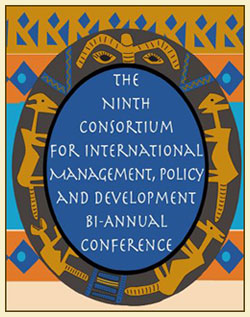The Ninth CIMPAD Conference (2013) was held in Windhoek, Namibia.
The conference theme, “Pillars for Sustainable Development: A Call for Proposals”, focused on health, education, public management and policy, sustainable economic development, global trade and comparative advantages, politics and conflict resolution among interfaith communities. Other factors crucial for achieving sustainable development in the global context, such as the post bilateral and multilateral aid reality expected for Namibia and several other African countries, also received significant attention.
The Consortium for International Management, Policy, Administration and Development is, indeed, much more than just another conference. It is a commitment to participate as full partners on the global stage by helping empower citizens with resources for the sustainable development of their communities. The 2013 CIMPAD Conference in Windhoek, Namibia emanated from this commitment and facilitated development of a new set of institutional linkages, faculty exchanges, collaborative research and program activities among African, between African and American and other public service professionals.
2013 Conference Cover Letter
 The bi-annual conference of the Consortium for International Management, Policy and Development (CIMPAD) took place from June 23-26, 2013, in Windhoek Namibia. The theme of the conference was, “Pillars for Sustainable Development” and attracted abstract submissions from scholars and practitioners from many areas including, Public policy and Management, Business Development and International Trade, Educational policy, Culture and development, Youth, Gender and Development, Health Care policy and Poverty alleviation, Non-governmental organizations, Community Development, Technology and Sustainable Development and the Agricultural Sector.
The bi-annual conference of the Consortium for International Management, Policy and Development (CIMPAD) took place from June 23-26, 2013, in Windhoek Namibia. The theme of the conference was, “Pillars for Sustainable Development” and attracted abstract submissions from scholars and practitioners from many areas including, Public policy and Management, Business Development and International Trade, Educational policy, Culture and development, Youth, Gender and Development, Health Care policy and Poverty alleviation, Non-governmental organizations, Community Development, Technology and Sustainable Development and the Agricultural Sector.
The invitation of many fields of study illustrates the vast range and diversity that exists within the theme of “Pillars for Sustainable Development.” This is beneficial to the readers as it allows readers to view sustainability from non-traditional lenses encouraging a deeper level of learning. Combining the abstracts in one venue makes the area of sustainable development more accessible, forcing the reader outside of their pre-determined ideas of what sustainable development entails.
In addition, the contributing authors aid in helping readers out of their comfort zones due to the vast locations of their home institutions which range from Pittsburgh, Pennsylvania to sub-Sahara, Africa. In reading the abstracts, the reader may encounter scenarios that they expected in some locations, but also come across problems in sustainability which they had not realized were problematic in other locations.
Overall, the abstracts which have been collected showcase the broad area of sustainability, while showcasing a need for increased awareness to the problems surrounding sustainable development.


